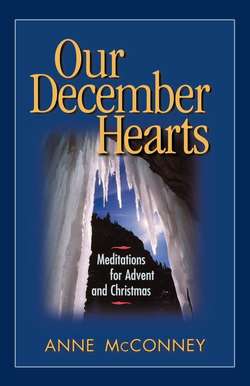Читать книгу Our December Hearts - Anne McConney - Страница 6
На сайте Литреса книга снята с продажи.
NOVEMBER 27 WALKABOUT
ОглавлениеThe time of Advent is a strange time, a season of dark, a season of waiting. It is also, perhaps oddly, a season of movement and journeying, a season of discovery. It carries within it a powerful sense of a place left behind and a place not yet reached. Advent is filled with loss and regret and unshaped possibilities. Advent sings to us of death and birth and rebirth.
Among the native Australians there is a custom called walkabout. When a man or woman feels the need for spiritual renewal, he or she sets out, usually on foot, to go where chance or fate or impulse may lead, to see the world as it is in this particular place on this particular year or month or week or day, to drink the present moment in all its fullness and thus quench the thirst of the spirit. It is an ancient and wise custom.
In the Christian year, Advent is the season of walkabout.
It is a paradox that this should be so, that this season in which we huddle near warmth and light should also be the season when we open our minds to all the potentialities of God's creation. Deep in November the sun wanes quickly and the nights are heavy with a frost as cold as ancient bones. This is a time that chilled our primitive ancestors with dread, a time when the sun began to sink and fail, and who knew if it would ever come again? These antique memories, foolish as we know them to be, still ride in our genes, still shape our human legacy. Somewhere in the core of our being we know that we were born for the light, and the loss of it fills us with anguish.
If ever there was a time for walkabout, these dim and waning days of early winter are when we need it most. Let the body crouch by its fireside if it must; let it light its lamps against the dark that comes too swiftly and too soon. The walkabout that we call Advent is a thing of the spirit that wanders where it will, a letting in of possibility, an exploration into hidden places, and finally a song whispering in leafless trees and carried on the hard, pure air. “Come,” it sings. “Here the journey begins, and it is long and not for the faint of heart. Here there be dragons.”
Advent is the time when we prepare for the coming of the Christ child, the time when we stand mute and awestruck, as blinded by wonder as any shepherd on a Middle Eastern hill, the time when—in the words of poet Loren Wilkinson—“God let go of Godhead in a child.”
This is the central statement of Christianity, the solid baseline of our theology from which all else follows: God let go of Godhead and lived as a human being. The God who created a cosmos larger than we can imagine and more beautiful than we can bear was born as a small, squalling infant. The God who made an eternity without beginning or end, who made time and the passage of time with all its ruthless necessities of birth, growth, aging and death, also came to live in time. God came to walk amid friends, companions and enemies, to watch the seasons come and go over a parched and dusty land, to know the past only as a memory and the future only as hope and fear. God came to live through—even as we do—the ills and joys, the pleasures and confusions that are the inevitable heritage of flesh and bone and blood.
This is the terror that strikes us to the root of our souls and the glory that burns in our blood. This is the question we fear and yet must ask: what does it mean to be human? What does it mean to believe that God was human too? What think ye of Christ?
So the Advent walkabout is not an easy journey, nor was meant to be. This journey leads into the deeps of our own being. It is an opening of portals we have taken care to keep closed, a letting in of the knowledge and doubt and pain without which there can be no letting in of the Christ, the child whose touch blesses, burns, heals and transfigures.
The Advent walkabout cannot be for the fainthearted for it demands extravagant courage and uncompromising honesty. It begins today. It ends at the manger that is not merely a pretty story but the transforming reality of God.
